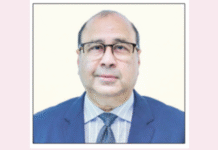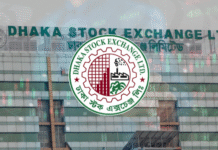
Private sector credit growth extended its gains for the second straight month in August driven by loans given under the stimulus packages aimed at reviving the economy.
The year-on-year credit growth stood at 9.36 per cent in August, up 9.20 per cent from a month earlier, according to data from the central bank.
Credit growth had decreased in the two years to April before increasing in May and declining once again in June. It started an upward trend in July, a sign of the steady recovery process of the country’s economy.
The outstanding loans in the private sector stood at Tk 11,01,676 crore as of August in contrast to Tk 10,95,202 crore in the previous month.
“The implementation of various stimulus packages has given a boost to the country’s private sector credit growth,” said MA Halim Chowdhury, managing director of Pubali Bank.
Banks are now trying to expedite the loan disbursement in the two sectors as the central bank is emphasising on the issue, Chowdhury said.
Lenders have been sitting on excess liquidity for the last couple of months as the central bank has injected funds into the market in different forms to revive the economy, said Emranul Huq, managing director of Dhaka Bank.
In addition, credit demand from the private sector is yet to reach a strong position as had been in the pre-Covid-19 period, he said.
Despite that, banks are looking for avenues for investment to keep the wheel of their profitability moving, he said.
Activities in some areas of the private sector have recently picked up, in a very positive development for the financial sector.
Companies from steel, cement, health and food sectors now apply for fresh loans, which are gradually widening the loan books of banks, Huq said.
The construction of the mega infrastructural projects has resumed, putting a positive impact on credit growth.
“The credit-deposit ratio in my bank declined to 81 per cent during the lockdown period. But the ratio now stands at 84 per cent,” said Huq.
But banks are still cautious in giving out loans to the sectors that have been affected by the recession as they believe the repayment could be hampered, he said.
He acknowledged that the implementation process of the stimulus package for the SME sector had achieved less than what was expected.

Profit of a large number of SMEs is mainly dependent on two large religious festivals: Eid-ul-Fitr and Eid-ul-Azha. But this year the festivals were celebrated amidst the pandemic when the economy was struggling to survive.
Against this backdrop, the production of the industries faced a major setback as people cut their spending massively to protect themselves from financial hardship, Huq said.
“This has slowed down the recovery of the SME sector.”
The credit growth will pick up slightly in the months to come, said Syed Mahbubur Rahman, managing director of Mutual Trust Bank.
The majority of the stimulus packages will have to be implemented by October and the credit growth will go up simultaneously in this period, he said, adding that the credit growth may face challenge from November.
“The economy has recently picked up but more time is needed to regain the full tempo,” said Zahid Hussain, a former lead economist at the World Bank Bangladesh.
Businesses are now reluctant to set up new industries because of the ongoing slowdown in the economic recovery and the pandemic, he said.
Purchasing power and demand for products will have to be increased to get rid of the meltdown, Hussain said.
He, however, said credit growth may go up in the coming months due to the fund disbursed from the stimulus packages.
“But the country’s recovery will take place in keeping with the global trend,” he said.









